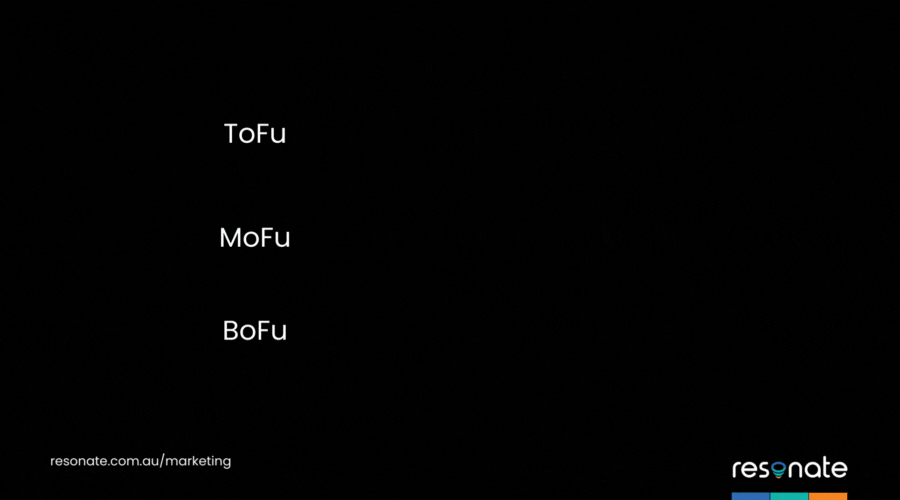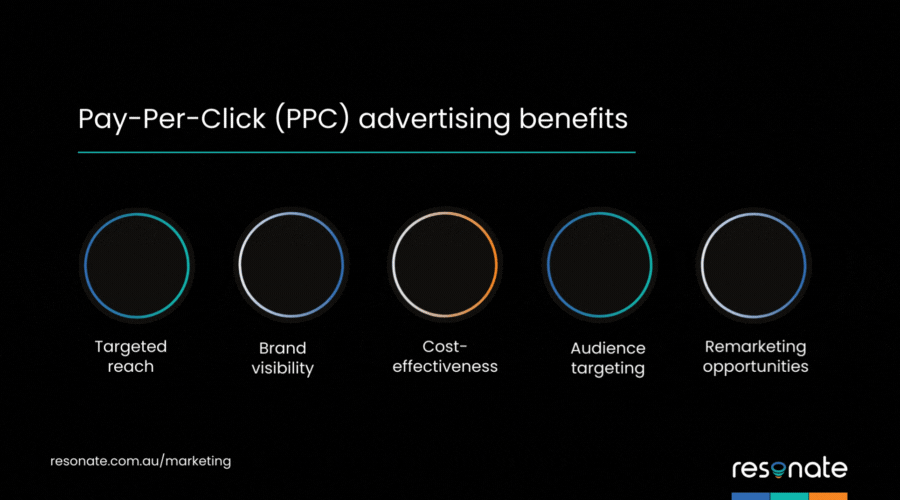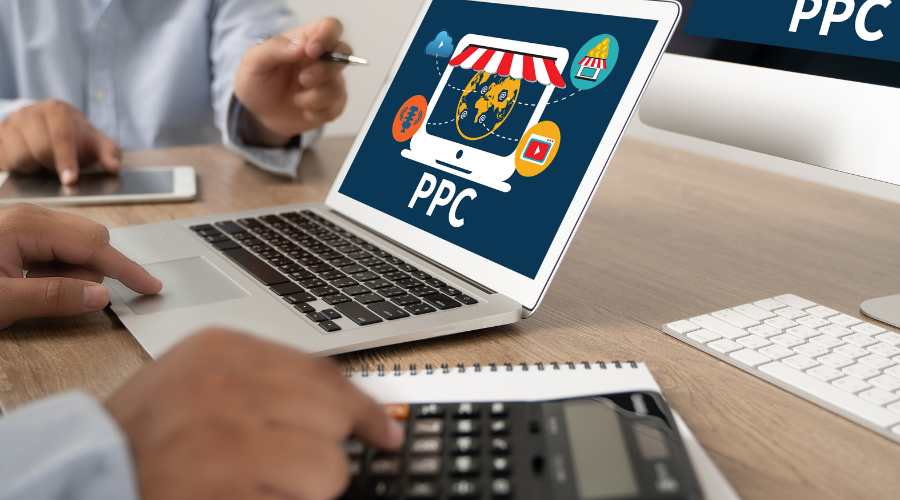As a CMO, I am frequently in discussion with business leaders seeking to increase sales and drive revenue. With many marketing options available today, deciding which is best for your organisation can be challenging. One option worth your consideration is Pay-Per-Click (PPC) advertising. PPC is a tool that can specifically target potential customers and provide you with quick, measurable results. In this blog, I cover why PPC is relevant to B2B organisations, how to set up an effective PPC campaign and explore its benefits. If you want to reach the right people, make your brand more visible, and get a good return on your spending, PPC could be the right choice for your organisation.

Why PPC is relevant to B2B organisations
In B2B marketing, where sales cycles are long and involve multiple stakeholders, creating effective touchpoints is crucial. With an average B2B sale cycle requiring at least eight interactions and involving three or more decision-makers, the challenge is not just making an initial contact but maintaining a presence throughout the buying journey, which can extend over several months.
PPC offers B2B companies a versatile platform to initiate the first crucial touchpoint and maintain ongoing engagement with potential clients at various stages of their decision-making process.
Here is how PPC can be strategically leveraged across the sales funnel to engage potential clients at every critical juncture:
Top of the Funnel (TOFU)
At this stage, the goal is to cast a wide net to generate new leads, particularly from companies not yet in your sales pipeline. PPC campaigns can significantly increase brand visibility, drive new impressions, and direct relevant traffic to your site, effectively opening the door to potential new business relationships.
Middle of the Funnel (MOFU)
As leads progress through the funnel, staying top-of-mind becomes essential. PPC allows for creating touchpoints that reinforce your brand’s competence and reliability. By presenting compelling content that addresses your audience’s specific needs and pain points, you can spur serious consideration and bring more stakeholders into the conversation, nurturing leads towards a decision.
Bottom of the Funnel (BOFU)
When potential clients are on the cusp of making a purchase decision, PPC can play a decisive role in tipping the scales in your favour. PPC can drive conversions and accelerate sales by targeting key decision-makers with ads highlighting your product or service’s unique value propositions and benefits.

The benefits of PPC advertising
PPC advertising stands out for its ability to efficiently target and engage potential customers. It offers several key benefits that can significantly enhance your marketing efforts.
Highly targeted reach
PPC advertising excels in delivering your message to a specific audience. Through platforms like Google Ads and social media channels, you can target users based on:
Demographics: Age, gender, income level, and more.
Interests and behaviours: User interests, online behaviours, and past interactions with your website.
Search intent: Targeting keywords that potential customers use in their searches.
Precise targeting ensures that your ads are shown to those most likely to be interested in your products or services, increasing the efficiency of your ad spend.
Brand visibility
In competitive markets, standing out is crucial. PPC ads can significantly enhance your brand’s visibility by:
Immediate exposure: Ads can appear at the top of search engine results, instantly putting your brand in front of potential customers.
Targeted placement: Display ads can be placed on relevant websites within your industry, keeping your brand in sight as users browse.
Consistent and prominent visibility helps keep your brand top-of-mind for potential customers, even if they’re not immediately ready to make a purchase.
Cost-effectiveness and measurable ROI
One of the most appealing aspects of PPC advertising is its cost-effectiveness and the ability to measure ROI:
Pay for Performance: With PPC, you only pay when someone clicks on your ad, ensuring that your budget is spent on actual engagement.
Analytics and Tracking: Comprehensive analytics allow you to track conversions and calculate ROI, making it easier to see the effectiveness of your campaigns and adjust as needed.
Reference Point: Research case studies or industry reports highlighting successful PPC campaigns, focusing on the ROI and cost-effectiveness to underscore the potential financial benefits.
Precise audience targeting
Beyond basic demographics, PPC advertising offers advanced targeting options to reach your ideal customer:
Geo-Targeting: Target ads to specific geographic locations, from countries down to local suburbs.
Device Targeting: Optimise campaigns for specific devices, reaching users on mobile, tablet, or desktop, depending on your strategy.
These advanced options allow for even more granular control over who sees your ads, enhancing the relevance and effectiveness of your campaigns.
Remarketing opportunities
Remarketing is a powerful feature of PPC that lets you reconnect with individuals who have previously visited your website. Remarketing can:
Boost conversion rates: By targeting users who have already shown interest in your products or services, remarketing campaigns often see higher conversion rates.
Increase brand recall: Keeping your brand visible to these past visitors helps increase brand recall, making it more likely they’ll return to make a purchase.
Remarketing strengthens your overall marketing strategy by nurturing potential customers through repeated, relevant engagements, moving them closer to conversion.
By leveraging these benefits, PPC advertising can play a pivotal role in achieving your marketing objectives, from increasing brand awareness to driving conversions, all while providing the tools to measure and optimise for the best possible ROI.

Planning your PPC campaign
A well-planned PPC campaign is critical to success. To ensure your campaign hits the mark, focus on defining clear objectives, conducting thorough keyword research, and writing compelling ad copy.
Setting clear objectives
Start with clarity on what you aim to achieve with your PPC campaign. Common objectives include:
Brand Awareness: Increasing visibility among your target audience.
Lead Generation: Gathering information from potential customers.
Sales: Directly driving purchases or sign-ups.
Define your goals in measurable terms to track your campaign’s effectiveness and make data-driven decisions.
Keyword Research
Keywords connect your ads to the right audience. To find the best keywords:
Use Tools: Leverage platforms like Google Keyword Planner for insights on search volume and competition.
Seek Relevance: Choose keywords that closely match your product or service and the intent behind potential customers’ searches.
Balance: Aim for a mix of broad and specific keywords to capture a wide range of search intents.
Reference Point: Look into recent data or articles that illustrate the significance of precise keyword selection in enhancing PPC campaign outcomes.
Crafting compelling ad copy
Your ad copy should grab attention and prompt action. Keep these points in mind:
Benefits First: Highlight the key benefits of your offering. What problem does it solve? Why should someone click your ad?
Clear Call to Action: Use strong verbs to encourage clicks. Phrases like “Learn More,” “Sign Up Today,” or “Get a Free Trial” work well.
A/B Testing: Continuously test variations of your ad copy to see what resonates most with your audience. Small tweaks in wording or structure can significantly impact click-through and conversion rates.
Concentrating on these aspects will make your PPC campaign not only well-targeted but also equipped to effectively engage and convert your intended audience.

Conclusion
PPC advertising is a powerful lever in B2B marketing, offering precision, flexibility, and measurable outcomes. Businesses can significantly enhance their visibility and engagement with potential clients by carefully planning campaigns and tapping into PPC’s targeted and cost-effective nature. The key lies in strategic execution and continual optimisation, ensuring every click contributes to achieving your overarching business goals.
Partner with Resonate for PPC advertising success
At Resonate, we specialise in crafting and managing PPC campaigns that resonate with your target audience and drive meaningful results. Whether you are new to PPC or looking to optimise your existing campaigns, our team can help. Visit our Advertising page to learn more about what we offer, or contact us to start your journey towards impactful PPC advertising.
Related Blogs
8 ways marketers can align with C-Suite objectives
Building buyer trust: Use cases and case studies in B2B marketing




